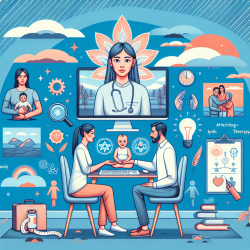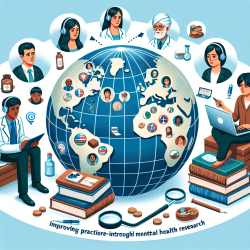As the field of speech-language pathology continues to evolve, the integration of online therapy has become increasingly prevalent, especially in the wake of the COVID-19 pandemic. A recent study titled Therapeutic Alliance in Online and Face-to-face Psychological Treatment: Comparative Study provides valuable insights that can help practitioners enhance their therapeutic alliance (TA) in online settings.
Therapeutic alliance, a crucial predictor of successful therapeutic outcomes, encompasses three components: agreement on therapy goals, agreement on tasks, and the affective bond between therapist and patient. This study evaluated the differences in TA based on intervention modality (online or face-to-face), type of attachment, and diagnosis among 291 subjects aged 18-30 years.
Key findings from the study include:
- Face-to-face treatments resulted in significantly better TA scores compared to online treatments (t=–42.045, df=289, P<.001).
- Individuals with secure attachment exhibited better TA compared to those with insecure attachment (t=6.068, P<.001).
- No significant differences were observed in TA concerning diagnosis, age, or sex.
For practitioners at TinyEYE, these findings underscore the importance of focusing on strategies to strengthen the therapeutic alliance in online therapy. Here are some evidence-based recommendations:
1. Enhance Communication Skills
Effective communication is the cornerstone of a strong therapeutic alliance. In online settings, therapists should:
- Use clear and concise language to avoid misunderstandings.
- Maintain eye contact by looking at the camera, not the screen.
- Utilize reflective listening to validate the client's feelings and experiences.
2. Foster Secure Attachment
Attachment theory suggests that individuals with secure attachment are better able to form strong therapeutic alliances. Therapists can:
- Provide consistent and reliable interactions to build trust.
- Encourage self-disclosure and collaborative understanding.
- Be responsive and supportive to help clients feel safe and valued.
3. Provide Training and Support for Therapists
To improve the efficacy of online therapy, it is essential for professionals to receive adequate training. This includes:
- Understanding the technical aspects of online therapy platforms.
- Developing skills to manage the unique challenges of remote therapy.
- Participating in continuous professional development to stay updated with the latest research and best practices.
While the study indicates that face-to-face therapy currently results in a stronger TA, it is clear that with appropriate training and strategies, online therapy can be equally effective. Practitioners are encouraged to integrate these insights into their practice to enhance therapeutic outcomes for children and other clients.
To read the original research paper, please follow this link: Therapeutic Alliance in Online and Face-to-face Psychological Treatment: Comparative Study.










